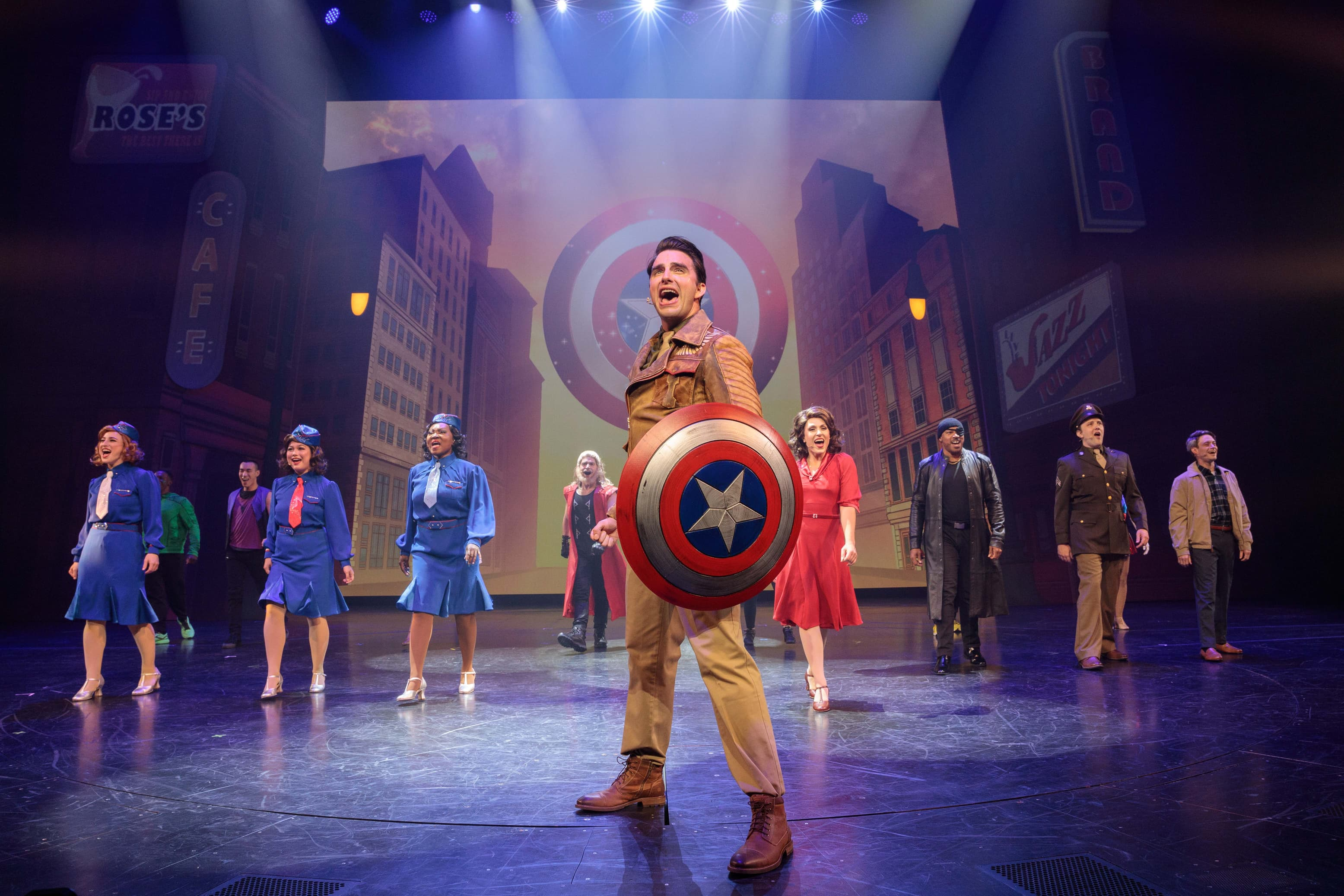I was recently reminded that the Disney park in California actually put on a 45-minute version of the Rogers: The Musical scenes from Hawkeye, so I watched first the first performance, and then the last performance of it. Turns out that if it happens in a Disney park you can probably find a high-quality recording of it on YouTube.
I like Rogers: The Musical as the goofy thing it is, which is a supposedly in-universe Hamilton-ising of Steve Rogers’ story. It starts off fairly faithful to the movies, and then as it goes on gets, as seen in Hawkeye, increasingly inaccurately silly. (It’s pretty clear the whole thing is engineered around the song we saw in Hawkeye.) And then it starts raising questions it doesn’t have answers to. Because where Alexander Hamilton is long dead, just another dead guy in history, Steve Rogers and his coworkers are… not.
A short note on chronology
Both versions I’ve watched present what you’re about to see, in the grand tradition of place-based theme park chronology, as the world premiere of Rogers: The Musical, which means, in theory, you’re watching the exact 19 December 2024 premiere performance Clint attends in Hawkeye.1Hawkeye 1×01: “Never Meet Your Heroes” (2021)
Let’s just get into it: What exactly is this based on?
Steven Grant Rogers was enough of a public figure and then, with the SSR, surrounded by enough historically notable people, that the WW2 section of the story is easy enough to source from what we can easily imagine are several history books and biographies that broadly speaking agree with each other. This is what he was like as a youth, how he came to join Abraham Erskine’s Project Rebirth, how he saved the Howling Commandoes. Rogers was a living legend before he went into the ice, and it’s easy to imagine something akin to the Chernow Hamilton coming out between 2011, when Fury pulls him back out,2Captain America: The First Avenger (2011) and 2016, when Rogers, together with his co-conspirators Wanda Maximoff, Natasha Romanoff, and Sam Wilson go into hiding after falling out of favour with the United States government.3Captain America: Civil War (2016)
It’s the rest of the story that’s harder to justify a source for. Sure, the SHIELD leak and its presumably extremely public dissemination through journalism and government hearings4Captain America: The Winter Soldier (2014) covers the Battle of New York,5The Avengers (2012) and a lot of other stuff that’s skipped over in the Save the City montage, which is presumably how the musical knows about Steve’s list, though I think that’s weirdly personally specific, and about Fury being there when he woke up. Fury is a known figure in the world by 2024, but his notorious shadowyness will be why they don’t have much to work with for his actual personality and go for “sassy” instead. There’s probably another book out there in the world that you can get this from.
But then it gets really messy. Obviously Ant-Man was not at the Battle of New York. But Fury also rambles off, in 2011, years before most of these people join or even get their powers, but okay, whatever, a whole Avengers roster. Let’s go through them one by one.
- “A Panther in Wakanda.” Sure, T’Challa’s association with the Avengers is presumably just a known fact.
- “A Sokovian named Wanda.” As far as the public is concerned, the way she dealt with Crossbones’ attack in Lagos is the reason for the Sokovia Accords6Captain America: Civil War (2016) and after that she breaks out of the Raft and becomes an international fugitive. Footage probably exists of her fighting alongside the Avengers at Novi Grad and at the Battle of Earth. I’ll accept it, but it’s a little weird.
- “A Star who is a planet’s son.” There’s genuinely no way Peter Quill is a known entity on Earth or that anyone knows he’s Ego’s son. The same is true for the rest of the Guardians — at most I’m willing to accept people know about “the tree and the raccoon who were there at the Battle of Earth.”
- I can’t quite make out the line, “An AI who ran his own” something, but Vision. About as believable as Wanda, sure.
- Spider-Man. Sure, the world’s knowledge of Peter Parker was erased ~10 days before this,7Spider-Man: No Way Home (2021) but we know about Spider-Man.
- “A lawyer who can’t really see.” Matt’s identity is not public knowledge as far as I know.
- “A raccoon and a talking tree.” Like I said.
- War Machine. Doctor Strange. Sure, these are probably public enough figures.
This all works just fine in our universe, but not really in theirs. To the Alex Daily of Earth-199999, these would be ridiculous allegations or revelations. People who know Matt make jokes, right, but there’s not that many blind lawyers associated with the Avengers8Spider-Man: No Way Home (2021), and people make jokes about Matt, sure, but we just don’t know some of this stuff. I can’t possibly justify a source for biographical details about Star-Lord.
The Save the City montage then rambles through a bunch of the big fights. These are all public knowledge. But is Steve’s use of the Time Stone to go back first to Peggy and then to make sure he does that a thing the public knows about? Nobody’s even really there to witness this conversation. Jim Barnes and Sam Wilson are aware of the broad facts of it, but why would they ever go on the record about this anywhere? As far as the Alex Daily of Earth-199999 would be concerned, Captain America simply hasn’t been seen since shortly after the Battle of Earth. Not that weird, he’s still legally an international fugitive.
Some of these details are on the level of, everyone involved must’ve been keeping detailed journals, but when would those even have been released? It’s December of 2024, it hasn’t even been that long since the Battle of Earth.
Conclusion
The idea of a Hamilton-analogous Rogers: The Musical is fun. These are public figures in this fictional world, they’d have certain cultural positions. But Steve Rogers was an international fugitive like ten months before this moment. If that position has changed, we don’t know about it. It’s weird to make a pretty hagiographic musical about this dude at this moment in time, right? It’s weird.
So here’s the only reasonable conclusion I can come to. From statues of mass murderer Confederates to a recent President currently out on bail, America has always had an element of, let’s call it, a willingness or even a desire to admire or worship the worst of itself. On Earth-19999, in December of 2024, based on Rogers: The Musical‘s relationship to the reality of Earth-199999, I posit to you that Steve Rogers might be who that admiration is currently predominantly aimed at. There might be Rogers Republicans, a CapAnon movement. HYDRA-emblazoned “SHIELD Lives Matter” stickers on pick-up trucks.
Which means the reason Clint is the only Avenger attending opening night is he’s the Republican Avenger. Oof, yikes. Couldn’t be me, Clint. Fix your heart, man.




